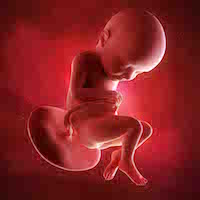24 Weeks Pregnant
At 24 weeks, your pregnant belly may be a magnet for relatives and strangers alike who want to touch your tummy. While you don’t have to let anyone touch your belly if it makes you uncomfortable, most people are just excited about your little one moving around in there.
What’s happening with your body?
 Symptoms of pregnancy may be similar to the last few weeks. You might notice an increase in leg cramps as your uterus continues to expand. Your baby is growing quite rapidly these last few weeks, which probably means your belly is also growing quickly. If your skin has not started to itch, you might notice it this week as your skin stretches more.
Symptoms of pregnancy may be similar to the last few weeks. You might notice an increase in leg cramps as your uterus continues to expand. Your baby is growing quite rapidly these last few weeks, which probably means your belly is also growing quickly. If your skin has not started to itch, you might notice it this week as your skin stretches more.
Speaking of your skin, week 24 may bring some addition skin changes. You might be one of the lucky ones who has that pregnancy glow. But pregnancy hormones can also cause other skin changes, such as acne and skin tags.
Both acne and skin tags are caused by hormones. If you are experiencing breakouts, wash with a mild facial cleanser and consider using an astringent to get rid of excess oil. Before using any acne medication, talk with your doctor. Some acne products are not recommended while you are pregnant.
As far as skin tags, they may disappear several months after you deliver. If they don’t go away after you have your baby, talk to your healthcare provider about options to remove skin tags.
Some women also develop brown spots on their face. Pregnancy hormones can cause an increase in pigmentation, which can result in patchy, brown spots. There is not too much you can do about brown spots. In some cases, using a sunscreen may help.
What’s happening with your baby?
 Your little one is putting on weight. She has still not filled out enough to be the chubby, newborn you imagine, but she is getting there!
Your little one is putting on weight. She has still not filled out enough to be the chubby, newborn you imagine, but she is getting there!
She is also maturing, and some of her body systems are becoming more sophisticated. For example, her brain activity is very close to that of a newborn. Cells in her brain are advanced enough that researchers believe she can form memories.
Along with her brain, other body systems are preparing for life on the outside. The branches of her lungs, as well as specialized respiratory cells are developing. The specials cells in the lungs will produce a substance called surfactant, which is important to help your baby’s lungs inflate when she is born.
Her hearing is also becoming more efficient. Your baby’s brain is processing sounds and the bones in her middle ear that play a role in hearing have formed. Research has shown that babies in the womb often respond to sound by turning their heads.
Your baby can probably hear your tummy gurgle, your breathing and your voice. Since researchers think your baby can form memories, it may be a good idea to start playing her a few lullabies. The music you play for her now may be familiar to her after she is born and have a calming effect.
Things to keep in mind
There are a lot of decisions to make when you are having a baby from picking a name to choosing where to give birth. One decision you may not have thought about is whether or not to bank your baby’s cord blood.
Cord blood banking involves taking the blood from your baby’s umbilical cord after birth and storing it in a special facility. Cord blood contains stem cells, which in some instances can be used to treat your child or a relative if they develop diseases, such as cancer.
You can store cord blood is a private facility, but there is an associated cost. If you choose this route, the cord blood would be there for your use in the future if needed.
There are pros and cons to cord blood banking. For example, private cord blood banks charge a fee to store the blood. Researchers are not sure how long cord blood can be used. Also, even if your child did get sick, cord blood may not be the recommended treatment. But in other cases, the use of cord blood could be lifesaving.
Before making a decision, talk to your doctor to have your questions answered. If you do decide to bank your baby’s cord blood, tell your healthcare provider before you deliver, so that he can take the needed actions.